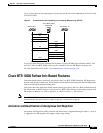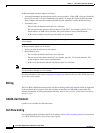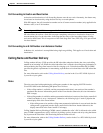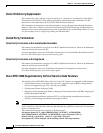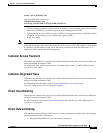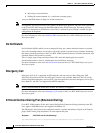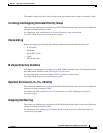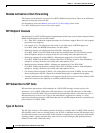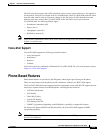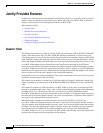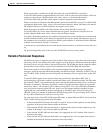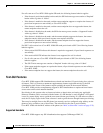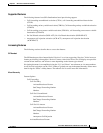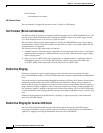
2-13
Cisco BTS 10200 Softswitch SIP Protocol User Guide
OL-5352-03
Chapter 2 SIP Protocol Subscriber Features
Phone-Based Features
The ToS value for messages sent to SIP subscribers can be set on a system-wide basis—this applies to
all subscribers. The policy is selected in the CA-CONFIG table. The Cisco BTS 10200 reads the values
from this table when it starts up. Therefore, changes to the ToS policy for SIP subscribers become
effective at the next restart of the Cisco BTS 10200. If the ToS entries are not provisioned in
CA-CONFIG table, the following defaults apply:
• Precedence= immediate (010)
• Delay= low (1)
• Throughput= normal (0)
• Reliability= normal (0)
Note These are the recommended values; these values should be changed only after careful consideration, or
if there is a specific need.
Voice-Mail Support
Cisco BTS 10200 supports the following voicemail features:
• Voice-mail deposit
• Notification
• Retrieval
• Callback
Voice-mail systems are configured as SIP trunks in Cisco BTS 10200. For voice-mail operation, refer to
Chapter 4, “Voice-Mail Support.”
Phone-Based Features
Phone-based features are provided by the SIP phone, which require provisioning on the phone.
There are some features that the phone provides standalone, without Cisco BTS 10200 support.
The Cisco BTS 10200 Softswitch supports interface requirements (such as Re-INVITE support) that are
necessary to operate features from the SIP phones, including but not limited to:
• Call Hold and Resume
• Call Waiting
• Three-Way Calling
• Cancel Call Waiting
• Call Waiting Caller ID
• CODEC Up-speeding (Depending on the SIP phone’s capability to support this feature)
For feature calls between MGCP and SIP subscribers, the Cisco BTS 10200 supports CODEC
up-speeding capability.
Note If CODEC re-negotiation fails (because either the SIP phone or the MGCP gateway does not support it),
the call is disconnected.



